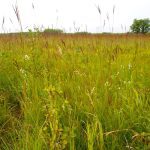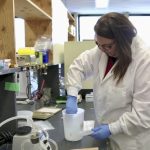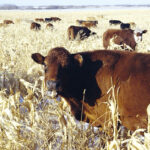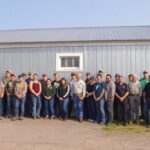
Tag Archives Beef Cattle Research Council

Forages offer protection from flooding
Research on the Record with Reynold Bergen
Manitoba’s Hydrologic Forecast Centre predicted a major risk of spring flooding along the Red River a few days before this column was written. Spring floods are an annual concern in Manitoba. High precipitation, heavy soils and a flat topography mean that floodwaters can spread with devastating consequences, especially when ice jams prevent meltwater from flowing […] Read more

The evolution of beef research in Canada
As the Beef Cattle Research Council marks its 25-year milestone, the people involved look back at the council’s formation, research achievements and look forward to where it’s all headed
Regular pregnancy checks, a routine regimen of vaccinations and working on extended grazing are just three of the many improvements Matt Bowman has implemented on his Thornloe, Ont. farm because of sound research from Canada’s Beef Cattle Research Council (BCRC). Bowman, along with thousands of producers and the beef industry, has reaped many rewards as […] Read more

Alfalfa for Canada’s climate
Nature doesn’t always provide conveniently severe winters to select for survival
Very few of the alfalfa varieties sold in Canada were developed under Canadian conditions. The CFIA registered 119 varieties in Canada between 2012 and 2022, but only four (AAC Nikon, AAC Meadowview, AAC Bridgeview and AAC Trueman) were developed in Canada. The other 115 came from breeding programs in China, Australia, California, Washington State or […] Read more

Knowledge and Technology Transfer more useful, more relevant
Research on the Record with Reynold Bergen
When the Beef Cattle Research Council formed nearly 25 years ago, we simply funded research projects and relied on researchers and provincial extension services to help producers learn about and adopt relevant results on their operations. We deliberately didn’t do much extension because we didn’t want to give governments an excuse to reduce their extension […] Read more

Cows on the Planet aims to inform public about beef production
News Roundup from the May 2022 issue of Canadian Cattlemen
Cows on the Planet is a new podcast series designed to present balanced, science-based information on beef production, environmental issues and related topics to consumers. Dr. Kim Stanford, University of Lethbridge livestock pathogen researcher; Dr. Tim McAllister, one of Agriculture Canada’s leading ruminant nutritionists and microbiologists at Lethbridge; and David Hill, University of Lethbridge, have […] Read more

Cut costs in your herd carefully
Research on the Record with Reynold Bergen
Research that’s underway now won’t solve this year’s drought, but it should help us deal with the next one. By the same token, research done during the big drought of the early 2000s provides some valuable lessons about managing the cow herd in today’s drought. Dr. Cheryl Waldner of the Western College of Veterinary Medicine […] Read more

Protecting one of your greatest investments – your calves
Research on the Record with Reynold Bergen
Producer surveys suggest that five to eight per cent of calves typically die before weaning. High winter feed costs mean you’ve already invested a lot in the 2022 calf crop. That investment is lost when calves die before weaning. Scours and respiratory disease are two leading causes of preventable disease and death in young calves. […] Read more

From Recife to Edmonton: Dr. Gleise Silva takes the helm of new research chair
Silva has a reputation for creating opportunities and an interest in connections between multiple research areas
Growing up in Recife, Brazil, an Atlantic port city criss-crossed by bridges and waterways that draws comparisons to Venice, Gleise Silva may have seemed like an unlikely candidate for a future beef cattle research chair. But Silva knew she wanted to work with animals one day. Her interest in agriculture and animals persisted through high […] Read more

Is this a good investment?
Research on the Record with Reynold Bergen
The Beef Cattle Research Council (BCRC) projects featured in this column are funded by the Canadian Beef Cattle Check-Off. When the check-off increased a few years ago, the BCRC’s budget rose from around 15 cents to 67 cents per head marketed. This allowed us to start some new research programs. Now that we’re a few […] Read more

Building foundational skills
If you’re new to beef production or looking to expand your skillset, start with our roundup of resources for practical skills and knowledge No matter where you are in your career, there’s always value in learning something new. When the Maritime Beef Council created the Atlantic Beef School, the goal was to provide the region’s […] Read more



